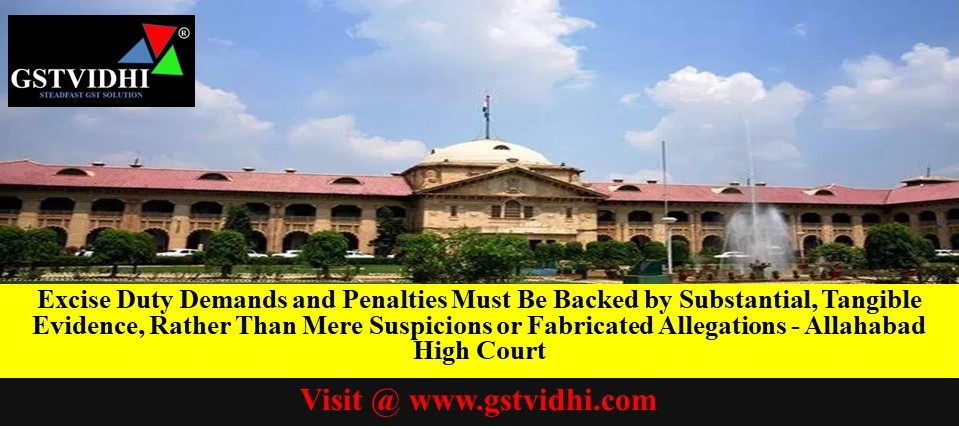
Case Analysis: M/S Continental Cement Company vs. Union of India
& Others
Case Details
- Case Name:
M/S Continental Cement Company vs. Union of India & Others
- Case No.:
Central Excise Appeal No. 228 of 2010
- Date of Order:
September 2, 2014
- Court:
Allahabad High Court
- Judges:
Hon’ble Dr. Satish Chandra, J. and Hon’ble Tarun Agarwala, J.
Summary of the Case
This case revolves around
allegations of clandestine removal of cement by M/S Continental Cement Company
without paying central excise duty. The Central Excise Department relied on an
anonymous complaint and certain allegedly forged parallel documents to demand
duty and impose penalties. The tribunal upheld the department's claim, but the
appellants challenged this order before the Allahabad High Court. The High
Court set aside the tribunal’s order due to a lack of concrete evidence,
reaffirming the importance of substantive proof in tax evasion cases.
Facts of the Case
1. M/S
Continental Cement Company, a private limited company, was engaged in the
manufacture of ordinary Portland cement, subject to the Central Excise Act,
1985.
2. An
anonymous complaint was received, alleging that between February 9, 1993,
and September 27, 1995, the company sold 3,839.350 MT of cement without
paying excise duty amounting to Rs. 7,20,154/-.
3. The
complaint was supported by documents such as General Purpose Invoices (GPIs),
invoices, challans, bills, cash memos, and Goods Receipts (GRs).
4. Based
on this complaint, the Excise Department:
o Issued
a demand of Rs. 7,20,154/- under Rule 9(2) of the Central Excise Rules,
1944 read with Section 11-A(1) of the Central Excise Act.
o Imposed
penalties amounting to Rs. 3,50,000/- under Rule 173Q.
o Levied
an additional penalty of Rs. 7,20,154/- under Section 11-A-C.
o Penalized
the directors of the company – Ajit Kumar, Jagmohan Goel, and Smt. Kamlesh
Tayal – with fines totaling Rs. 3,65,000/-.
5. The
company and its directors challenged these penalties before the Commissioner
(Appeals), who allowed their appeal and set aside the demand.
6. The
Department filed an appeal before the Customs, Excise & Service Tax
Appellate Tribunal (CESTAT), New Delhi, which decided in favor of the
department ex parte.
7. The
appellants' request for recall of the order was rejected, prompting them to
approach the Allahabad High Court.
Submissions by the
Petitioner (M/S Continental Cement Company)
- Forgery Allegation:
The anonymous complaint and supporting documents were fabricated by an
ousted director, Anil Kumar, with the help of an accountant, Sri
Vasts, both of whom had been dismissed for financial misappropriation.
- No Evidence of Extra Sales:
The company argued that no cement was sold outside the books and that
there was no corroborative evidence of clandestine removal.
- Forgery of Signatures:
One of the directors, Ajit Kumar, stated that his signature was
forged on the parallel documents.
- Delayed Complaint:
The complaint was entertained 4-5 years after the alleged transactions,
rendering it unreliable.
- Lack of Supporting Proof:
The department failed to prove the actual manufacture and clearance of the
goods in question.
Submissions by the
Respondent (Union of India & Others)
- The anonymous complaint contained
supporting documents, which were enough to establish clandestine
removal.
- Buyers' Admissions:
The department summoned some alleged buyers, who claimed to have
received cement from the company in cash transactions.
- The department relied on the Supreme
Court judgment in Prakash Metal Works vs. Collector of Central Excise,
Ahmedabad (2007), arguing that circumstantial evidence was sufficient
to establish tax evasion.
Findings of the Court
1. Forgery
Established:
o A
forensic expert, Shubhashis Dev (Government Examiner, Shimla), examined
the documents and concluded that all the documents were written by the same
person, which cast serious doubts on their authenticity.
2. Lack
of Investigation by the Department:
o The
department failed to investigate key aspects to establish clandestine
removal, such as:
§ Excess
production records.
§ Purchase
of additional raw materials.
§ Transporter
records and vehicle movements.
§ Banking
transactions showing unaccounted sales.
§ Electricity
consumption, which would indicate extra production.
3. Buyers’
Statements Were Unreliable:
o The
statements of alleged buyers were based on memory alone and lacked
supporting documentary evidence.
o Two
major buyers, M/S Singhal Cement Agency and M/S Praveen Cement Agency,
had already closed their businesses before giving statements.
o Another
buyer, M/S Taj Traders, denied signing most of the documents.
4. No
Substantial Evidence of Tax Evasion:
o The
court held that excise duty demands cannot be raised solely on the basis of
presumptions and assumptions.
o The
motive of the complainant (ousted director) was questionable.
o The
department adopted a shortcut approach without investigating material
facts.
Judgment of the Court
- The Allahabad High Court set aside
the CESTAT order, ruling in favor of M/S Continental Cement Company.
- The court restored the order of
the Commissioner (Appeals), which had nullified the duty demand and
penalties.
- The appeals filed by the company
and its directors were allowed.
- The court reaffirmed that tax
demands based on assumptions without corroborative evidence cannot be
sustained.
Conclusion
The case highlights the
importance of concrete evidence in tax evasion matters. The department’s
reliance on an anonymous complaint and forged documents without verifying
production records, raw material purchases, or transport details proved
fatal to its case. The Allahabad High Court’s ruling reinforced that excise
duty demands and penalties must be backed by substantial, tangible evidence,
rather than mere suspicions or fabricated allegations.
Disclaimer: All the Information is based on the notification, circular and order issued by the Govt. authority and judgement delivered by the court or the authority information is strictly for educational purposes and on the basis of our best understanding of laws & not binding on anyone.
Find the Attachment (Press on Click Here )
Click here